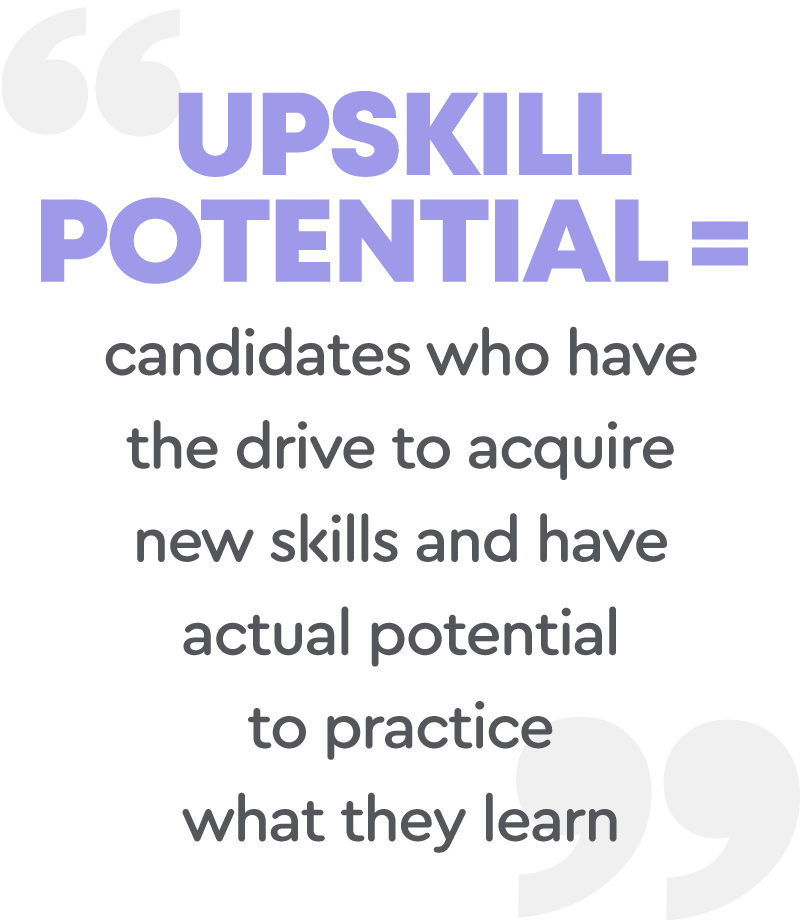Upskill Strategically: Ask These Interview Questions to Identify High-Potential Candidates

After years of searching for reliable strategies to overcome the talent gap, more organizations are settling on upskilling as a primary solution. Consider Amazon. They’re using programs like their Amazon Technical Academy to pull promising nontechnical workers from within their ranks and train them to excel in technical roles. The tech giant’s goal is to upskill 100,000 employees by 2025.
And they’re not alone. At the beginning of the year, the World Economic Forum acknowledged they could no longer overlook the talent gap, responding with the launch of The Reskilling Revolution Platform. The initiative’s goal is to upskill one billion people by 2030 through partnering with specific countries, industries, organizations, and schools. Since then, the pressures of COVID-19 have prompted even more companies around the world to embrace upskilling as a way to prevent disruption of their services or production.
When hiring for upskill potential, you need to identify candidates who have the drive to acquire new skills and have actual potential to practice what they learn. Here are a few interview questions to ask as you identify candidates with upskill potential:
1. When was the last time you took a professional risk? What did you do to ensure your success?
Why: Developing any new skill takes courage. Unless you’re dealing with a savant, most people struggle to learn an aspect or two of a new skill set. Candidates who can embrace risk, face failure, and expand their knowledge are more likely to thrive in your training program.
What to look for: Pay close attention to the candidate’s responses. Their understanding of why they made each decision and found success or learned from their failure will tell you a great deal about how they’ll adapt to a new learning environment, along with whether they’ll choose to persevere when things inevitably get not so easy.
2. What do you do to learn difficult materials?
Why: When a candidate is learning a new subject or skill, is there a method to the madness? There should be. It’s hard to provide employees with the necessary resources or assistance if you have to learn along the way what works for them. Those who are familiar with their learning style will be better equipped to ask you for help if (and when) they’re out of their depth.
What to look for: How they articulate their strategy and how comfortable they feel developing new skills. Anyone who has a firm understanding of how they learn best — both their learning style (visual, auditory, kinesthetic, etc.) and their most effective techniques — will be ready to develop new skills.
3. How do you fit our business and culture?
Why: This question tells you how a candidate views your company, as well as what they consider their place in the organization. This helps you to better screen for culture fit and what they may be able to add to the team they are hoping to join. There’s a steep learning curve with retraining programs. If you’re investing in upskilling a candidate, they better be with you for a long time.
What to look for: Candidates who can (and already) envision themselves within your team. Their response will show you who has done their research, and who hasn’t — if someone can articulate on the fly how they feel about themselves fitting within your culture, it speaks volumes about their preparation, comprehension, and retention skills
Remember: what you ask is only a part of the puzzle
Asking the right interview questions will help to identify great candidates for upskilling, but it’s not the only step to think about in your screening interview process. Determining the right fit for future roles (i.e. what roles will you need to upskill for) is equally important. So is having a plan to approach flex needs for your business that will allow you to be proactive in upskilling your team members.
And, of course, the interviewing platform that you choose matters as well, especially at the current moment when much of your team is working remotely.
The ability to watch candidates’ nonverbal cues, whether you’re interviewing them in real-time or reviewing recordings of their responses, can reveal traits like confidence and energy, giving you a better picture of how well they could grow with you.
Whether you’re upskilling or not, it’s critical to find the interview questions to ask that will identify the right talent, externally and internally, to fill demanding skill gaps. The interview tools and processes you use make all the difference between quickly identifying people to fill open roles in your organization or settling for a persistent skills gap. Let us know if we can help you recruit candidates.
About The Author
Meghan Peterson is the VP of Revenue at interviewstream. She combines her experience in sales, recruiting, and tech to support customers of all sizes in her role. If you’d like to pick her brain about her advice here or simply start a conversation, feel free to give Meg a shout at mpeterson@interviewstream.com.
